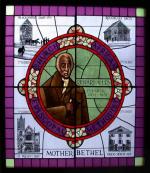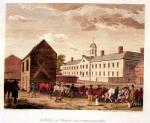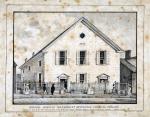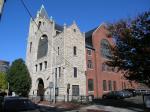![header=[Marker Text] body=[Founded on ground purchased by Richard Allen in 1787, this congregation is the mother church of the African Methodist Episcopal denomination. The present structure, erected 1889, replaces three earlier churches on this site.] sign](http://explorepahistory.com/kora/files/1/10/1-A-27C-139-ExplorePAHistory-a0h8z3-a_450.jpg)
Mouse over for marker text
Name:
Mother Bethel A.M.E. Church
Region:
Philadelphia and its Countryside/Lehigh Valley
County:
Philadelphia
Marker Location:
6th and Lombard Sts.
Dedication Date:
March 19, 1991
Behind the Marker
Before the Revolutionary War, most of Pennsylvania's African Americans were slaves who lived with their masters on farms, iron plantations, or in city houses. The largest concentration of slaves, about 1,000, was in Philadelphia, where, despite the efforts of Quaker abolitionists, only eighteen were manumitted (granted their freedom) in the decade before the American Revolution. After the war, however, the number of free blacks swelled from about 1,500 in 1780 to more than 6,400 by 1800.
Few African Americans were welcome at religious services in Pennsylvania until 1784 when Richard Allen and Absalom Jones were licensed to preach at St. George's Methodist Church. Both men had been born into slavery, worked to purchase their freedom, and made their way to Philadelphia to find employment. Allen and Jones encouraged the city's growing black worshippers to form their own congregations after being forced to sit in the balconies during services at some of the city's churches.
Having received schooling and religious training in their youth, the two men were eventually offered the use of St. George's Church to preach to black congregants on Sunday mornings at 5:00 am. When, in 1787, a confrontation developed on the issue of blacks uniting with the white congregation for religious services, Allen and Jones quietly led their worshippers out of St. George's Church and established an independent Free African Society for the purpose of mutual aid.
Free African Society for the purpose of mutual aid.
While a majority of the Free African Society's members wanted to unite with the Episcopal Church - whose bishop William White may have assisted in forming the Free African Society - and asked Jones to become their spiritual leader, others wanted to remain Methodists, whose leaders John Wesley and Frances Asbury had strongly opposed slavery, and requested that Allen continue as their minister. In 1791 Allen purchased a lot at Sixth and Lombard Streets and began building a brick and stone "roughcast" church building.
The following year, Jones's congregants purchased two lots at Fifth and Adelphi Streets where they began building their own St. Thomas's Church. Construction was interrupted by the outbreak of the Yellow Fever epidemic in 1793, an event that allowed the city's blacks to demonstrate their courage and commitment to their white neighbors. During the epidemic, Allen and Jones, despite religious differences, organized their congregants to aid the sick and bury the dead. Their efforts, recognized by the mayor of Philadelphia, lessened the prejudice among at least some of the city's white residents.
organized their congregants to aid the sick and bury the dead. Their efforts, recognized by the mayor of Philadelphia, lessened the prejudice among at least some of the city's white residents.
With the passing of the yellow fever epidemic, Allen and Jones resumed their plans to build separate churches for the city's black worshippers. On July 29, 1794, Methodist Bishop Francis Asbury formally dedicated Allen's new church. Among the scripture readings that day were the verses from Genesis relating to Jacob's dream of the ladder to heaven at a place called "Bethel." Those verses inspired the congregation to name its church "Mother Bethel."
Incorporated in 1796, Mother Bethel represented the start of an entirely new religious denomination, the African Methodist Episcopal Church, which was formally organized in 1816. Invested as the first bishop of the new denomination, Allen continued to lead Bethel and the AME church until his death in 1831.
Mother Bethel played a key role in the fight against slavery in the early republic. Allen would petition Congress to abolish the federal Fugitive Slave Law of 1793, and offered his church as sanctuary to runaway slaves escaping bondage in the South. Mother Bethel, in 1830, also hosted the first national convention of blacks in the United States. That convention, presided over by Allen, persuaded African Americans to reject schemes to colonize them back to Africa and to publicly call for freedom in this country.
Located on the site where Richard Allen and his congregation built their first church in 1794, Mother Bethel continues to serve Philadelphia's African American community. Richard Allen lies buried in it.
Few African Americans were welcome at religious services in Pennsylvania until 1784 when Richard Allen and Absalom Jones were licensed to preach at St. George's Methodist Church. Both men had been born into slavery, worked to purchase their freedom, and made their way to Philadelphia to find employment. Allen and Jones encouraged the city's growing black worshippers to form their own congregations after being forced to sit in the balconies during services at some of the city's churches.
Having received schooling and religious training in their youth, the two men were eventually offered the use of St. George's Church to preach to black congregants on Sunday mornings at 5:00 am. When, in 1787, a confrontation developed on the issue of blacks uniting with the white congregation for religious services, Allen and Jones quietly led their worshippers out of St. George's Church and established an independent
While a majority of the Free African Society's members wanted to unite with the Episcopal Church - whose bishop William White may have assisted in forming the Free African Society - and asked Jones to become their spiritual leader, others wanted to remain Methodists, whose leaders John Wesley and Frances Asbury had strongly opposed slavery, and requested that Allen continue as their minister. In 1791 Allen purchased a lot at Sixth and Lombard Streets and began building a brick and stone "roughcast" church building.
The following year, Jones's congregants purchased two lots at Fifth and Adelphi Streets where they began building their own St. Thomas's Church. Construction was interrupted by the outbreak of the Yellow Fever epidemic in 1793, an event that allowed the city's blacks to demonstrate their courage and commitment to their white neighbors. During the epidemic, Allen and Jones, despite religious differences,
With the passing of the yellow fever epidemic, Allen and Jones resumed their plans to build separate churches for the city's black worshippers. On July 29, 1794, Methodist Bishop Francis Asbury formally dedicated Allen's new church. Among the scripture readings that day were the verses from Genesis relating to Jacob's dream of the ladder to heaven at a place called "Bethel." Those verses inspired the congregation to name its church "Mother Bethel."
Incorporated in 1796, Mother Bethel represented the start of an entirely new religious denomination, the African Methodist Episcopal Church, which was formally organized in 1816. Invested as the first bishop of the new denomination, Allen continued to lead Bethel and the AME church until his death in 1831.
Mother Bethel played a key role in the fight against slavery in the early republic. Allen would petition Congress to abolish the federal Fugitive Slave Law of 1793, and offered his church as sanctuary to runaway slaves escaping bondage in the South. Mother Bethel, in 1830, also hosted the first national convention of blacks in the United States. That convention, presided over by Allen, persuaded African Americans to reject schemes to colonize them back to Africa and to publicly call for freedom in this country.
Located on the site where Richard Allen and his congregation built their first church in 1794, Mother Bethel continues to serve Philadelphia's African American community. Richard Allen lies buried in it.
Beyond the Marker








